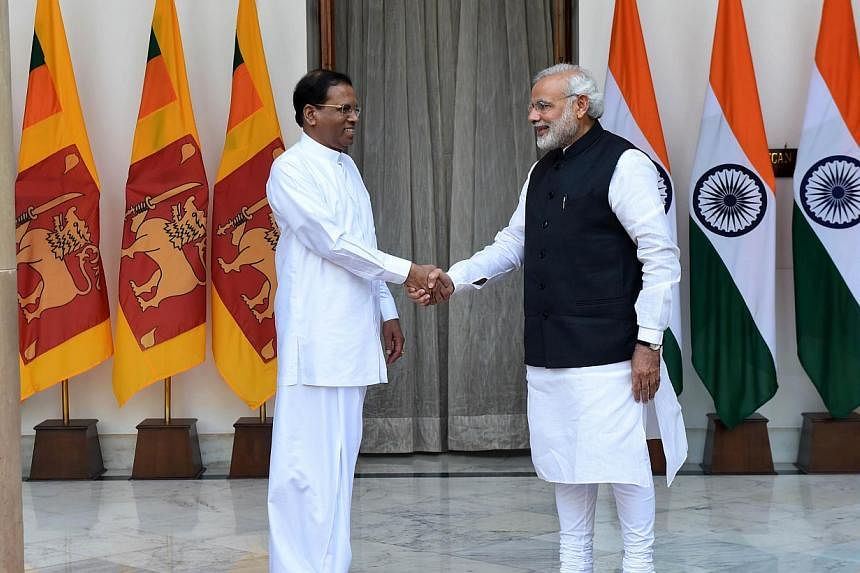Mr Narendra Modi is set to become the first Indian leader to visit Sri Lanka's war-torn Tamil heartland, sending a powerful message on reconciliation to the new government in Colombo.
His visit to Sri Lanka is part of a tour that also includes Seychelles and Mauritius, but all eyes are on the Sri Lanka leg. Here's a quick look at Mr Modi's itinerary and the significance of his trip:
What's in his itinerary?
Mr Modi will address Sri Lanka's parliament in Colombo on Friday, the third Indian leader to do so since Indira Gandhi in 1973 and Morarji Desai in 1979. He will also hold talks with President Maithripala Sirisena and Prime Minister Ranil Wickremesinghe.
On Saturday, he will visit the Tamil heartland of Jaffna, the centre of bitter fighting between government forces and Tamil rebels seeking independence. He will be the first Indian leader to visit Jaffna and the second foreign leader to do so, after British Prime Minister David Cameron who visited in 2013.
Mr Modi is also expected to visit the historic north-central city of Anuradhapura, home to Buddhism's holiest tree Sri Mahabodhi, which was brought to Sri Lanka from India over 2,500 years ago and attracts thousands of pilgrims every day. It is said to be the oldest tree in the world.
Why is the trip important?
1. A chance to reset bilateral ties
- Mr Modi's trip to Sri Lanka comes just weeks after the island's new president Maithripala Sirisena travelled to India and signals an easing of ties strained under former leader Mahinda Rajapakse, who cultivated close relations with rival China. Indian Foreign Secretary S Jaishankar said on Monday (March 9): "Obviously, the intent is to strengthen our overall ties with Sri Lanka and this has many aspects because we have a very broad-based, substantive relationship with that neighbour."
"Politically, we clearly want to promote and encourage the reconciliation process, support democracy and reform."
Political watchers say Mr Modi's visit will reset India-Sri Lanka ties.
"Modi's visit to Colombo will symbolically press the reset button on India-Sri Lanka ties," said Sadanand Dhume, India expert at the American Enterprise Institute in Washington. "There is tremendous optimism in both capitals of making progress on a host of economic and political issues. After losing ground to China, India hopes to re-establish its importance as Sri Lanka's top economic and strategic partner."
Another expert Siddharth Varadarajan said: "For the first time in a decade, the domestic impetus for peace and reconciliation within Sri Lanka is as strong or even stronger than the Indian capacity or even desire to push for a solution."
"That said, Modi is likely to encourage both the government and the TNA (Tamil National Alliance) leadership to move swiftly ahead," he added.
2. Possible progress on Tamil refugees in India
The Indian foreign secretary said the two countries were discussing how the around 100,000 Tamil refugees still living in India, many of them in government-run camps, could return to Sri Lanka "with honour, dignity (and) safety". Hundreds of thousands of Tamils fled to India at the height of the 37-year war between Sri Lankan forces and Tamil separatists that ended in 2009. They share close cultural ties with the southern Indian state of Tamil Nadu and many Indians were angered by their treatment under the former government. Analysts also said Mr Modi's visit would help build momentum for greater autonomy in Tamil areas after successive governments in Colombo failed to devolve power over law and order, and land to provincial councils.
3. Closer economic cooperation
Experts also expect the visit to focus on trade and investments. This comes as President Sirisena's government ordered a review of all Chinese-funded infrastructure projects and aimed to reduce Beijing's interest in the economy by trying to pay off expensive Chinese loans. Ahead of Mr Modi's visit to Sri Lanka, both countries have discussed the implementation of a free trade pact and stepping up economic cooperation, while addressing issues of trade imbalance.
SOURCE: AFP, REUTERS, ECONOMIC TIMES, THE HINDU BUSINESS LINE

